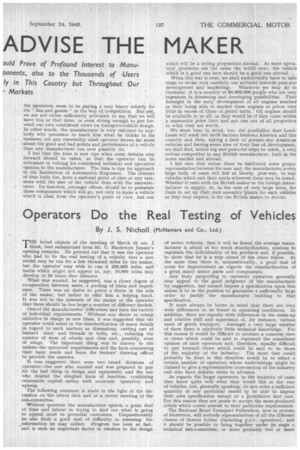LET THE OPERATOF ADVISE THE MAKER
Page 30

Page 31

If you've noticed an error in this article please click here to report it so we can fix it.
pROPERLY to explain the accompanying views on possible further co-operation between vehicle manufacturer and user, we must give a brief history of events leading up to these contributions from such well-known and experienced operators.
Early this year it was suggested to the Editor of" The Commercial Motor" that he should get together a panel of leading transport engineers, with' a view to consider ing the post-war requirements of users of commercial vehicles. The subjects to be discussed were to embrace types and sizes of vehicle specially' suited to the needs
of the road-transport industry, technical details of design as affecting the user, the trend of development, etc.—
in other words, to give the operating side of the industry an opportunity of becoming more articulate, and for details as to requirements to be feel through some co-ordinated channel, thus indicating to manufacturers, more exactly than had obtained in the past, users' wants, rather than those which the vehicle producer, from a considerable diversity of opinion and haphazard orders, may be brought to consider as meeting all • demands.
Following on this matter, the Editor invited to a , luncheon and conference a number of representative operators, nearly all of whom, amounting to over a dozen and covering the running of many thousands of vehicles, accepted.
• In introducing the subject, the Editor said that as "The Commercial Motor" is primarily an operators' journal, it naturally had their interests at heart. The.
operator has to do the real•testing of a vehicle, and the experience rep-resented by those present covered millions of miles. Therefore, a pooling of their ideas and knowledge should prove of inestimable value. At the same time, it would not do to cramp initiative in design or to discourage the trying out of new ideas—that would be a policy of retrogression. What was wanted was the provision of facts concerning basic" .needs. Certain important users had even , thought of producing for themselves, on an assembly basis, the particular types of vehicle they wanted, This, however, was a tendency which should not be encouraged, as it is not in the true national interest, for to obtain a good export market, the manufacturers must have access to an adequate home market.
There were concerned with the operation of road transport many highly skilled engineers, who should be able, with their vast experience of actual usage, to give most valuable advice as to the various essential requirements.
The meeting being thrown open for general discussion of the subject, some most interesting -‘7•iews were expressed, practically all those present participating. Their value is indicated by the fact that they covered 23 closely typed foolscap pages.
With a view to carrying the subject still farther, however, a working or sub-committee was formed, its members being:—Captain J.-4B. Walton, Captain Carlton , F. Roberts, and Messrs. J. S. Nichol]. and J. Shearman. At a meeting of this sub-committee it was decided to publish the accompanying individual comments and to convey with them an express invitation to operators
• (both amongst those who were present at the original conference and others who might be interested), also to manufacturers of vehicles, engines and components, to contribute further views.




























































